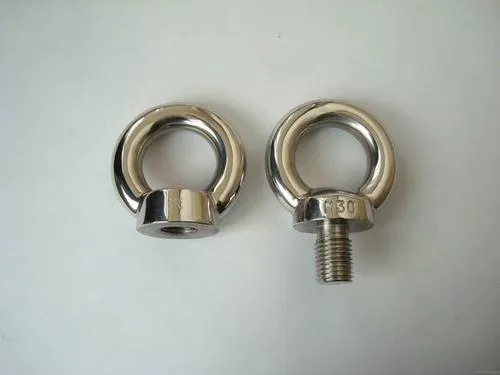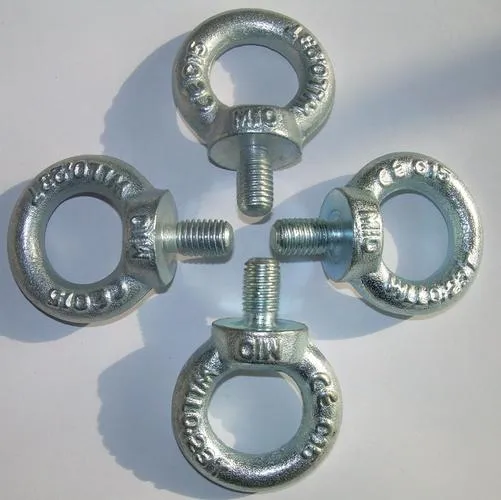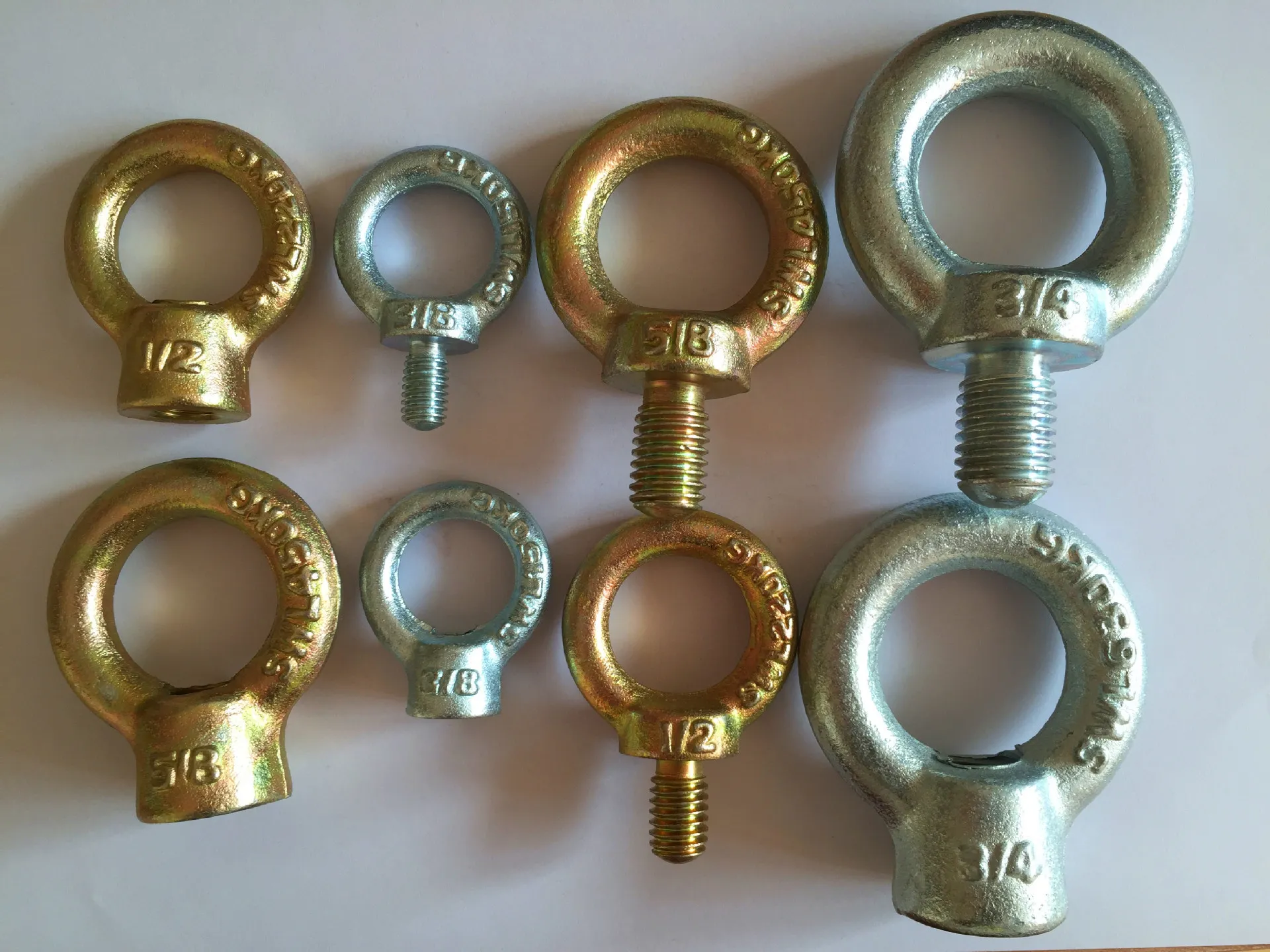Nachricht
Apr . 28, 2025 14:51 Zurück zur Liste
Choosing the Right Eye Bolts
Eye bolts are essential components in various industries, including construction, marine, and rigging. Whether you need to lift heavy machinery, secure loads, or create anchor points, selecting the right eye bolt is crucial. With different types of eye bolts available, it’s important to understand their specifications and applications before making a purchase. This guide will explore the various eye bolt types, key considerations when you buy eye bolts, an overview of lifting eye bolt standards, and the benefits of stainless steel ring eye bolts for different environments.

Understanding Different Types of Eye Bolts
When selecting the right eye bolt, knowing the different types of eye bolts available is essential. Eye bolts come in multiple designs, each serving a specific purpose depending on load type, lifting angle, and installation requirements. The most common types include:
- Shoulder Eye Bolts– These are designed with a shoulder between the eye and the shaft. They can handle both straight and angular loads, making them ideal for applications where side loading is required.
- Non-Shoulder Eye Bolts– Without a shoulder, these bolts are only suitable for vertical loads. Applying a side load may cause bending or breakage.
- Lag Eye Bolts– Instead of a standard threaded shaft, lag eye bolts have wood screw threads, making them ideal for anchoring into wood. These are commonly used in fencing, suspension systems, and overhead applications.
- Swivel Eye Bolts– Featuring a rotating eye, these bolts allow for movement and load adjustments. They are used in applications requiring flexibility and dynamic load changes.
- Machinery Eye Bolts– With a fully threaded shank, these eye bolts are designed for securing machinery and heavy-duty lifting applications.
Selecting the right type from the different types of eye bolts depends on whether the load will be applied vertically or at an angle, as well as the weight and environmental conditions.

Factors to Consider When You Buy Eye Bolts
When looking to buy eye bolts, several factors must be taken into account to ensure safety and durability. Choosing the wrong eye bolt could lead to equipment failure, accidents, or costly damages. Here’s what to consider:
- Material– Eye bolts are made from various materials, including carbon steel, galvanized steel, and stainless steel. If corrosion resistance is required, stainless steel is the best choice, while galvanized eye bolts provide moderate corrosion protection.
- Load Capacity– Each eye bolt has a specified working load limit (WLL). Always choose an eye bolt with a higher WLL than the intended load to ensure safety.
- Thread Type– Some eye bolts have coarse threads, while others have fine threads. Ensure compatibility with the material or equipment where the eye bolt will be installed.
- Installation Surface– If you are installing eye bolts into wood, lag eye bolts are the best option. For metal or concrete, threaded machinery eye bolts or anchor bolts are more appropriate.
- Certifications– If the application requires compliance with industry standards, verify that the eye bolt meets the necessary lifting eye bolt standards before purchasing.
Selecting the right eye bolt ensures the stability and safety of your application. Whether you need heavy-duty lifting solutions or simple anchoring points, understanding these factors will help you buy eye bolts with confidence.

Lifting Eye Bolt Standards and Safety Guidelines
Understanding lifting eye bolt standards is critical for ensuring safety in lifting operations. Eye bolts are subjected to rigorous testing and manufacturing standards to ensure they can handle the intended loads. Several global standards regulate the production and usage of lifting eye bolts:
- ASME B18.15– This standard defines dimensional requirements for forged and bent eye bolts used in lifting applications.
- DIN 580– This German standard specifies requirements for metric lifting eye bolts, including load capacities and material properties.
- BS 4278– A British standard that classifies eye bolts according to their application, such as collared eye bolts for angular loads.
- ISO 3266– This international standard applies to lifting eye bolts used in hoisting applications and specifies their mechanical properties.
Complying with lifting eye bolt standards ensures that eye bolts can handle loads safely and prevents failures. Before selecting an eye bolt, verify that it meets industry-specific requirements and is tested for load-bearing capacity.
Proper installation is also essential for safety. Always use eye bolts with the correct thread engagement and ensure that they are fully tightened. If side loading is unavoidable, use shoulder eye bolts to minimize stress on the bolt.
Benefits of Stainless Steel Ring Eye Bolts
For applications requiring corrosion resistance and durability, stainless steel ring eye bolts are an excellent choice. These eye bolts are made from high-grade stainless steel, making them ideal for outdoor, marine, and industrial environments. Key benefits include:
- Corrosion Resistance– Stainless steel prevents rust and corrosion, even in saltwater and chemical-heavy environments.
- High Strength– Despite their resistance to corrosion, stainless steel ring eye bolts offer impressive strength, making them suitable for both heavy lifting and general fastening applications.
- Aesthetic Appeal– The polished finish of stainless steel eye bolts makes them ideal for architectural and decorative applications.
- Longevity– Unlike standard steel or galvanized bolts, stainless steel options do not degrade over time, reducing the need for replacements.
- Versatility– These eye bolts are suitable for various applications, from industrial rigging to marine anchoring and construction.
If you require an eye bolt that can withstand harsh conditions without losing structural integrity, stainless steel ring eye bolts are the best option.
DIN580 Lifting Eye bolt FAQs
What are the most common different types of eye bolts used in lifting applications?
The most common eye bolts used in lifting applications include shoulder eye bolts, machinery eye bolts, and swivel eye bolts. Shoulder eye bolts are preferred when loads need to be lifted at an angle, while machinery eye bolts are used for securing heavy equipment. Swivel eye bolts allow for dynamic movement, making them ideal for applications requiring flexibility.
How do I ensure that the eye bolts I purchase meet lifting eye bolt stan dards?
To ensure compliance, check the manufacturer’s specifications and verify that the eye bolts meet standards such as ASME B18.15, DIN 580, or ISO 3266. Always buy from reputable suppliers that provide test certifications and load rating information for their products.
Why should I choose stainless steel ring eye bolts over galvanized ones?
Stainless steel ring eye bolts offer superior corrosion resistance compared to galvanized steel. If your application is exposed to moisture, chemicals, or saltwater, stainless steel is the best choice to prevent rust and ensure long-lasting performance. While galvanized bolts provide moderate corrosion resistance, they may wear out over time in harsh environments.
What factors should I consider when I buy eye bolts for construction purposes?
When purchasing eye bolts for construction, consider the load-bearing capacity, material, thread type, and installation surface. Opt for shoulder eye bolts if side loading is involved and ensure that the bolts meet lifting eye bolt standards for structural safety.
How do I properly install different types of eye bolts?
To install eye bolts correctly:
- Ensure the threaded hole is clean and compatible with the eye bolt.
- Insert the eye bolt and tighten it fully using the appropriate torque specifications.
- For lifting applications, use shoulder eye bolts to prevent bending.
- Avoid side loads unless the eye bolt is designed for angular lifting.
- Periodically inspect the bolts for signs of wear or damage to ensure safety.
By following these installation guidelines and choosing the right eye bolts for your specific needs, you can ensure secure and reliable fastening in any application.
-
Small components of lifting ring nuts with large load-bearing capacity
NachrichtNov.24,2025
-
Flower basket bolts inject stable strength into your project
NachrichtNov.18,2025
-
Although the lifting ring is small, its function is enormous
NachrichtNov.12,2025
-
Lifting shackle: The indispensable "safety connecting ring" in lifting operations
NachrichtNov.05,2025
-
Full analysis of lifting chain technology and application standards
NachrichtOct.31,2025
-
Card head usage guide
NachrichtOct.28,2025
